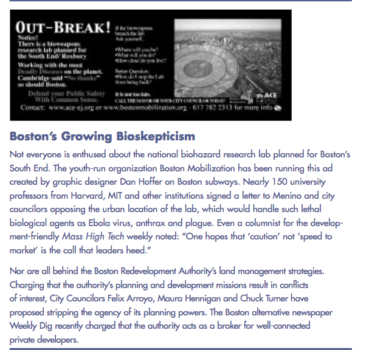 A few items from the quarantine …
A few items from the quarantine …
Wisdom from Zoom. COVID-19 has been a boon for Zoom and Slack (for people panicked by too many and too-slow emails). Last week, I zoomed into the Harvard Graduate School of Education (HGSE) Leadership Series conversation with Southern New Hampshire University (SNHU) President Paul LeBlanc and HGSE Dean Bridget Long. LeBlanc notes that the online programs adopted by colleges and universities everywhere in the age of COVID-19 are very different from SNHU’s renowned online platform. Unlike SNHU, most institutions have launched “emergency remote” work to help students stay on track. Despite worries in some quarters about academic quality, LeBlanc says the quick transition online is not about relaxing standards, but ratcheting up care and compassion for suddenly dislocated students. The visionary president notes that just as telemedicine is boosting access to healthcare during the pandemic, online learning could boost access to education.
Among other observations, LeBlanc explains that “time” is the enemy for traditional students who have to pause classes when, for example, their child gets sick. If they are students in a well-designed online program, they can avoid delays in their education despite personal disruptions. He also believes students will want to come rushing back to campuses after COVID-19 dissipates, but with the recession, he wonders if they’ll be able to afford it. Oh and, by the way, LeBlanc ventures that it’s unlikely campuses will open in the fall without a lot more coronavirus testing.
Summer learning loss becomes COVID learning loss. That’s the concern of people like Chris Minnich, CEO of the nonprofit assessment and research organization NWEA, founded in Oregon as the Northwest Evaluation Association. The group predicts that when students finally head back to school next fall (presumably), they are likely to retain about 70% of this year’s gains in reading, compared with a typical school year, and less than 50% in math. The concern over achievement milestones reminds me of the fretting over SATs and ACTs as well as high-stakes high school tests, being postponed. Merrie Najimy, president of the Massachusetts Teachers Association, notes that the pause “provides all of us with an opportunity to rethink the testing requirements.”
Another WPA for humanists? Modern Language Association Executive Director Paula M. Krebs recently reminded readers that during the Great Depression, the Works Progress Administration, though commonly associated with building roads and bridges, also employed writers, researchers, historians, artists, musicians, actors and other cultural figures. Given COVID-19, “this moment calls for a new WPA that employs those with humanities expertise in partnership with scientists, health care practitioners, social scientists, and business, to help shape the public understanding of the changes our collective culture is undergoing,” writes Krebs.
 Research could help right now. News of the University of New Hampshire garnering $6 million from the National Oceanic and Atmospheric Administration to build and test an instrument to monitor space weather reminded me of when research prowess was recognized as a salient feature of New England’s higher education leadership. That was mostly before jabs like the “wastebook” from then-U.S. Sen. Jeff Flake (R-Ariz.) ridiculed any spending on research that didn’t translate directly to commercial use. But R&D work can go from suspect to practical very quickly. For example, consider research at the University of Maine’s Lobster Institute trying to see if an extract from lobsters might work to treat COVID-19. Or consider that 15 years ago, the Summer 2004 edition of Connection (now NEJHE) ran a short piece (pictured at right) on an unpopular research lab being built by Boston University and the federal government in Boston’s densely settled South End to study dangerous germs like Ebola. The region was also a pioneer in community relations, and the neighborhood was tense about the dangers in its midst to say the least. But today, that lab’s role in the search for a coronavirus vaccine is much less controversial.
Research could help right now. News of the University of New Hampshire garnering $6 million from the National Oceanic and Atmospheric Administration to build and test an instrument to monitor space weather reminded me of when research prowess was recognized as a salient feature of New England’s higher education leadership. That was mostly before jabs like the “wastebook” from then-U.S. Sen. Jeff Flake (R-Ariz.) ridiculed any spending on research that didn’t translate directly to commercial use. But R&D work can go from suspect to practical very quickly. For example, consider research at the University of Maine’s Lobster Institute trying to see if an extract from lobsters might work to treat COVID-19. Or consider that 15 years ago, the Summer 2004 edition of Connection (now NEJHE) ran a short piece (pictured at right) on an unpopular research lab being built by Boston University and the federal government in Boston’s densely settled South End to study dangerous germs like Ebola. The region was also a pioneer in community relations, and the neighborhood was tense about the dangers in its midst to say the least. But today, that lab’s role in the search for a coronavirus vaccine is much less controversial.
Advice for grads in a difficult year. NEJHE is inviting economists and other experts on “employability” to weigh in on how COVID-19 will affect 2020’s college grads in New England. What does it mean for the college-educated labor market that has been another New England economic advantage historically?
Defense rests? One New England industry that is not shutting down due to COVID-19 is the defense industry. In Maine, General Dynamics Bath Iron Works ordered face masks for employees and expanded its sick time policy, but union leaders say the company isn’t doing enough to address coronavirus. More than 70 Maine lawmakers recently asked the company to consider closing temporarily to protect workers from the spread of the virus. But the Defense Department would have to instruct the shipyard to close, and Pentagon officials say it is a “Critical Infrastructure Industry.” About 17,000 people who work at the General Dynamics Electric Boat’s shipyards in Quonset Point R.I., and Groton, Conn., are in the same boat, so to speak. They too have been told to keep reporting to work. In New London, a letter in The Day pleaded with Connecticut Gov. Ned Lamont to shut down Electric Boat. Critical Infrastructure Industry. If only attack subs on schedule could help beat an “invisible enemy.”
John O. Harney is executive editor of The New England Journal of Higher Education.
Painting of “Wong’s Pot with Old Flowers” by Montserrat College professor Timothy Harney.
[ssba]
